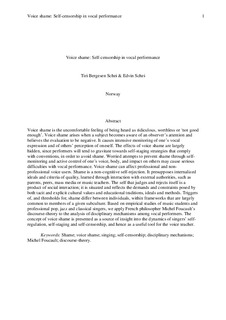| dc.description.abstract | Voice shame is the uncomfortable feeling of being heard as ridiculous, worthless or ‘not good enough’. Voice shame arises when a subject becomes aware of an observer’s attention and believes the evaluation to be negative. It causes intensive monitoring of one’s vocal expression and of others’ perception of oneself. The effects of voice shame are largely hidden, since performers will tend to gravitate towards self-staging strategies that comply with conventions, in order to avoid shame. Worried attempts to prevent shame through selfmonitoring and active control of one’s voice, body, and impact on others may cause serious difficulties with vocal performance. Voice shame can affect professional and nonprofessional voice users. Shame is a non-cognitive self-rejection. It presupposes internalized ideals and criteria of quality, learned through interaction with external authorities, such as parents, peers, mass media or music teachers. The self that judges and rejects itself is a product of social interaction; it is situated and reflects the demands and constraints posed by both tacit and explicit cultural values and educational traditions, ideals and methods. Triggers of, and thresholds for, shame differ between individuals, within frameworks that are largely common to members of a given subculture. Based on empirical studies of music students and professional pop, jazz and classical singers, we apply French philosopher Michel Foucault’s discourse-theory to the analysis of disciplinary mechanisms among vocal performers. The concept of voice shame is presented as a source of insight into the dynamics of singers’ selfregulation, self-staging and self-censorship, and hence as a useful tool for the voice teacher. | nb_NO |
